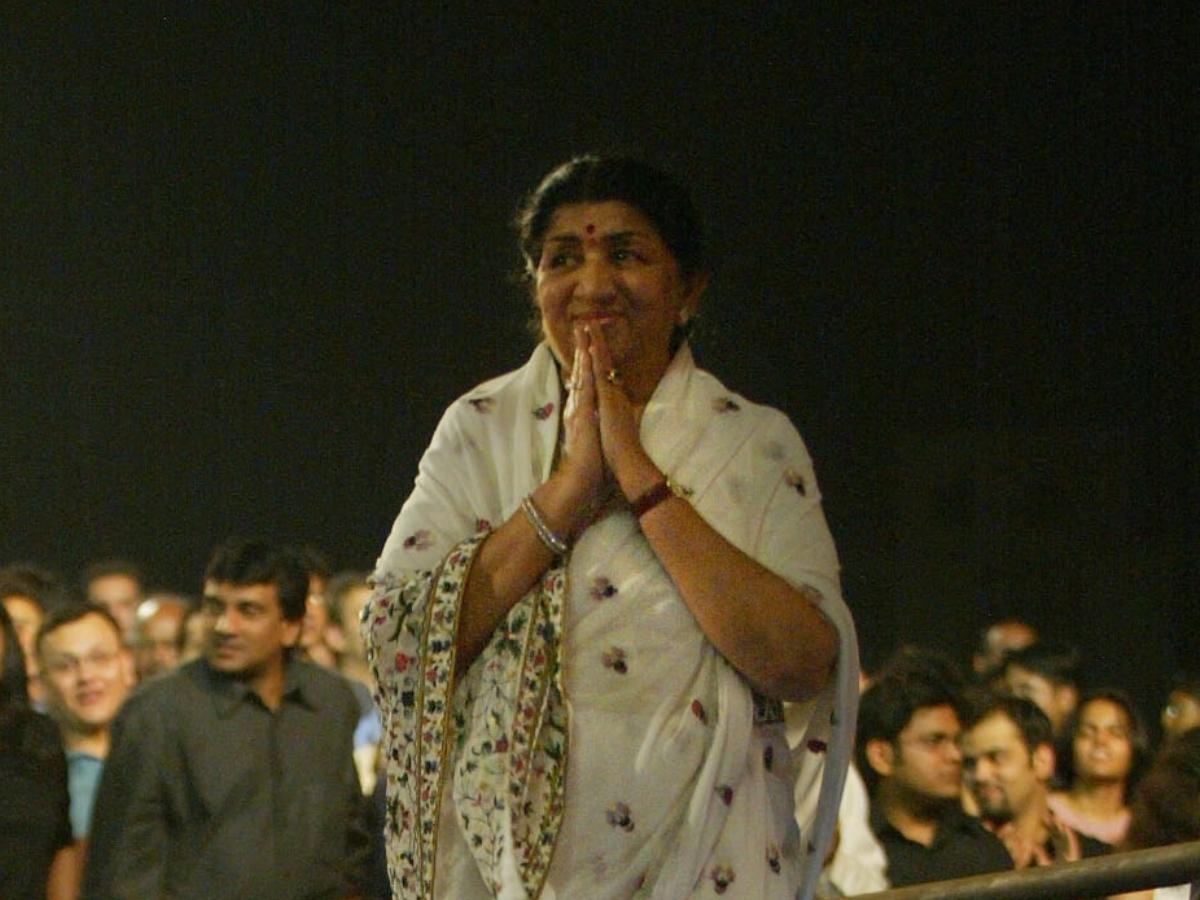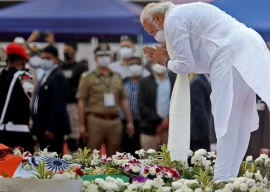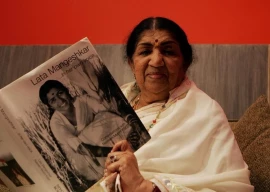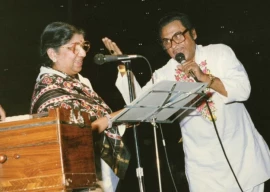
Lata Mangeshkar, whose warm and radiant voice captured hearts for more than half a century, passed away on Sunday amid acute grief and despair.
She was admitted to Mumbai’s Breach Candy Hospital on January 8 after she tested positive for Covid-19. She underwent weeks-long treatment in the Intensive Care Unit (ICU) before falling silent.
The legendary singer was cremated in Mumbai with full state honours with Indian Prime Minister Narendra Modi and stars of the entertainment industry gathering, along with large crowds, to pay respects.
Reverently dubbed the ‘Nightingale of India’ and affectionately called 'didi' (elder sister), Mangeshkar’s prowess placed her in the first rank of most revered vocalists in the sub-continent, with her voice echoing beyond the otherwise hostile borders. She leaves behind an indelible impact on the trajectory taken by Hindi film music post-Partition, when she first crooned into the ears of the infant nations.
The legendary vocalist’s illustrious career took off in the era of black-and-white cinema, with Mangeshkar lending her vocals to Bollywood songs alongside the likes of celebrated singers such as Mohammed Rafi and Kishore Kumar. From the classics like Mughal-e-Azam to new-era movies like Dil Wale Dulhaniya Le Jayenge, Lata's voice remained the moniker for Hindi cinema.
“With the death of Lata Mangeshkar the subcontinent has lost one of the truly great singers the world has known,” Prime Minister Imran Khan wrote on Twitter. “Listening to her songs has given so much pleasure to so many people all over the world.”
Read: Legendary Indian singer Lata Mangeshkar passes away
"I am anguished beyond words," India's Prime Minister Narendra Modi expressed grief on Twitter. "The kind and caring Lata Didi has left us. She leaves a void in our nation that cannot be filled. Coming generations will remember her as a stalwart of Indian culture, whose melodious voice had an unparalleled ability to mesmerise people."
In another tweet, he penned, "Lata Didi’s songs brought out a variety of emotions. She closely witnessed the transitions of the Indian film world for decades. Beyond films, she was always passionate about India’s growth. She always wanted to see a strong and developed India."
He added, "I consider it my honour that I have always received immense affection from Lata Didi. My interactions with her will remain unforgettable. I grieve with my fellow Indians on the passing away of Lata Didi. Spoke to her family and expressed condolences."
Pakistani politicians, too, extended condolences. PTI Senator Faisal Javed Khan shared, “Lata was one of the best subcontinent vocalists ever. Almost all of our generations grew up listening to Lata for the past 6 decades. Her contribution for promoting Urdu has been phenomenal.”
Fawad Chaudhry said: “A legend is no more. Lata Mangeshkar was a melodious queen who ruled the world of music for decades she was the uncrowned queen of music. Her voice shall keep ruling the hearts of people for all times to come."
Lata Mangeshkar: Unparalleled
Mangeshkar was born in 1929 and started her musical training early under the tutelage of her father Deenanath, singing in his theatrical productions when she was just five. Her father's death when she was only 13 forced her to take on the role of breadwinner to support four younger siblings, and the family eventually moved to Bombay, later renamed Mumbai, in 1945.
Forced by circumstance, with there being a shortage of singing opportunities in film early on, Mangeshkar turned to acting. Her acting career was brief, spanning a total of eight Marathi and Hindi films.
The singer spoke about her distaste for acting in one of her final interviews with The Quint. She shared, “Surprisingly, I was quite confident before the camera. It was just that I hated acting. I felt like a doll on being told, ‘Abhi tum hanso, abhi tum aansoo bahao [Now you laugh, now you shed tears]’. In a manner of speaking, it was like switching a tube light off and on within me.”
Considered by many to be India’s greatest-ever playback singer, the Ajib Dastan Hai Yeh singer dominated the Bollywood music scene with her sister, Asha Bhosle. She lends her voice to several iconic Hindi film actors, including Madhubala, Meena Kumari and Kajol.
Celebrated Bollywood producer and director Yash Chopra, who featured Mangeshkar prominently in his projects, said to the singer once that her voice “can suit the character of an underprivileged woman as well as that of a queen.”
Read: NAPA expresses sorrow over demise of legendary Lata Mangeshkar
Fight for recognition
Fiercely dedicated to her craft, Mangeshkar was the first playback singer to demand better pay and royalties for her music. She explained in an interview once, "I am a self-made person. I have learned how to fight. I have never been scared of anyone. I am quite fearless. But I never imagined I would get as much as I have."
The singer was also the first to demand acknowledgement in the film’s credits and record labels, which previously only mentioned the name of the character and not the playback singer. Speaking about her fight for recognition, Mangeshkar reflected, “Without any hesitation, I requested Raj Kapoor to give due credit to all the playback singers. When we sing for the heroine and the hero, why should their characters’ names be mentioned instead of ours?”
Mangeshkar also famously had a falling out with Mohammed Rafi over the issue of royalties, with the latter belonging to the opposite camp.
“I initiated the conversation about royalties for playback singers. Mukesh, Talat Mehmood and Mubarak Begum were with me on this issue. Mohammed Rafi, Mahendra Kapoor and some other artistes weren’t,” elaborated the singer, explaining that three years later, the two patched things up and continued working together.
Read: Treat your ears to these eight Lata Mangeshkar songs
Leaving a legacy
Along with her sister, Mangeshkar was accused time and again of establishing a monopoly over Hindi film music, with newer artists not being able to come to the fore because of the sisters’ hold on the industry.
Responding to the same, Mangeshkar said in an interview, “New playback singers would audition before the composers. And the gun would be fired from my shoulder. The composers would claim, “If we give you a song, Lata didi naaraaz ho jaayegi.” Angry? Absurd!”
She added, “I have enough sanity to know that in an industry which makes the highest number of films in the world, I couldn’t possibly have insisted that all the songs should be given to me.”
On her legacy, Mangeshkar reflected in another interview that she does not believe her music holds the same sway on younger generations. “Nowadays, young people’s attention span is very limited. They do not live in the past at all. It is the era of instant gratification. Everyone wants to live for the moment.”
As her parting words in her final interview, Mangeshkar shared, “I do believe in punarjanam (rebirth). Yet, when I am dead and gone, I certainly do not wish to be born again. Mujhe bhagwan dubara janam nahin de toh achha hai [It would be best if god does not reincarnate me]. One lifetime is enough.”


1732441915-0/BeFunky-collage-(12)1732441915-0-165x106.webp)

1732438802-0/BeFunky-collage-(11)1732438802-0-165x106.webp)


1732428810-0/Copy-of-Untitled-(3)1732428810-0-270x192.webp)
1732425487-0/BeFunk_§_]__-(42)1732425487-0.jpg)












COMMENTS
Comments are moderated and generally will be posted if they are on-topic and not abusive.
For more information, please see our Comments FAQ